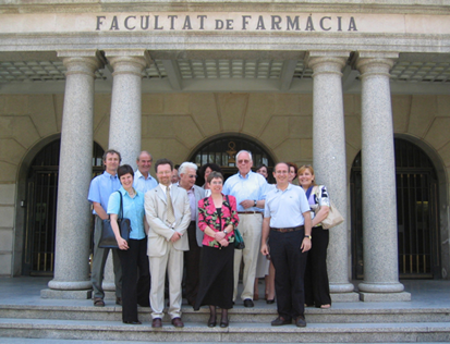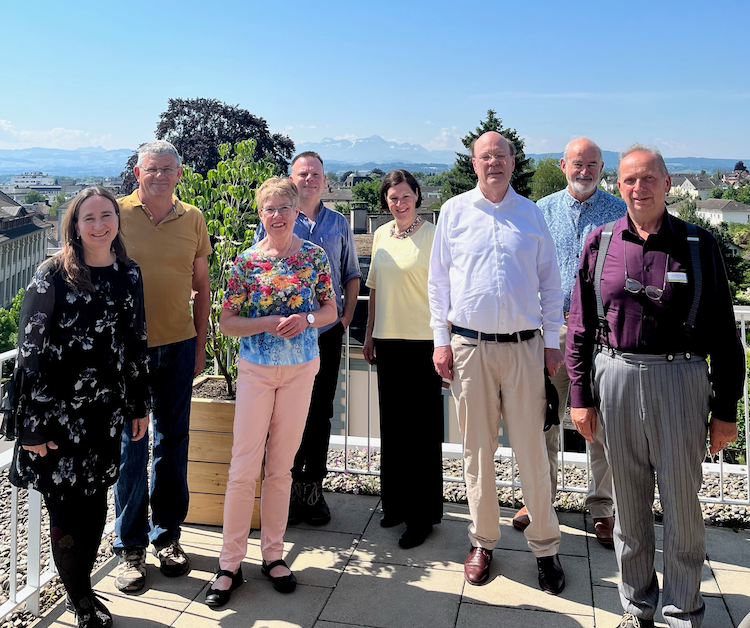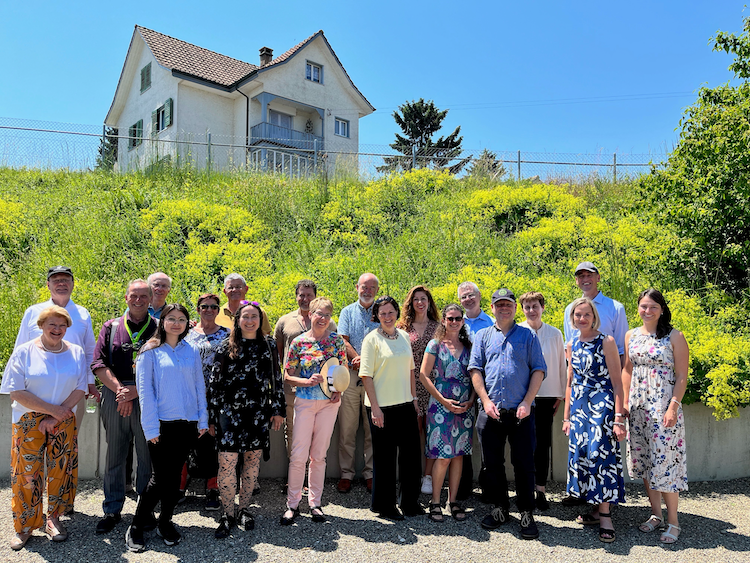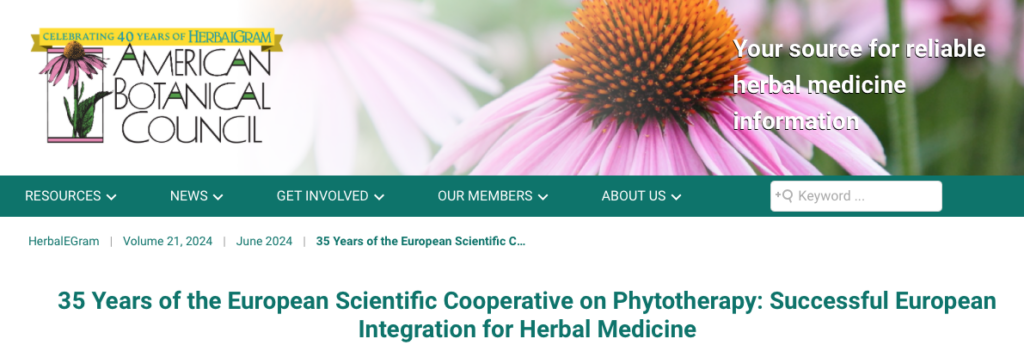This umbrella association of national phytotherapy societies has been working for 35 years to lead the way in harmonizing standards for herbal medicines across Europe
By Liselotte Krenn, PhD a,b, Bernat Vanaclocha, MD a,c, Evelyn Wolfram, PhD a,d and Simon Mills a on behalf of ESCOP
a European Scientific Cooperative on Phytotherapy (ESCOP; Exeter, UK)
b Division of Pharmacognosy, University of Vienna (Vienna, Austria)
c Sociedad Española de Fitoterapia (SEFIT) and Revista de Fitoterapia (Valencia, Spain)
d Natural Products and Phytopharmacy Research Group, Zürich University of Applied Sciences (Switzerland)
INTRODUCTION
The European Scientific Cooperative on Phytotherapy (ESCOP), an international scientific association that represents herbal medicine and phytotherapy societies in Europe, celebrates its 35th anniversary in June 2024. The organization’s mission is to “advance the scientific status of herbal medicinal products and to assist with the harmonisation of their regulatory status at the European level.”1
The success and widespread use of synthetic drugs in the first half of the 20th century led to a significant loss of traditional knowledge and an almost complete lack of regulatory frameworks for medicines of herbal origin. However, in the late 1970s, the “Green movement” in Europe fueled a significant increase in public interest in herbal products as well as calls for a harmonized legal framework. These developments led a small group of visionaries from Germany, the Netherlands, Belgium, France, Switzerland, and the United Kingdom to establish a European umbrella organization of societies in the field of phytotherapy and herbal medicine.
ESCOP was founded in Cologne, Germany, on June 18, 1989. Shortly thereafter, the organization appointed a scientific committee to support its aims and started to develop and publish reference monographs on the therapeutic use of herbal medicines. The first five monographs were published in October 1990 as a scientific consensus across different European countries and in the standard medicine dossier (“SPC”) format.* The monographs on anthraquinone- and hydroxyanthracene-containing herbal drugs (e.g., frangula bark, [Frangula alnus, Rhamnaceae] and senna leaf [Cassia senna, Fabaceae]) subsequently provided the basis for respective official documents of the Committee for Proprietary Medicinal Products (CPMP, now the Committee for Medicinal Products for Human Use) of the European Medicines Agency.
In the 1990s, the number of member societies in ESCOP increased, as did the number of scientific committee members. Monograph elaboration was accelerated by the division of the scientific committee into two working subcommittees (B and E).
Current Members of ESCOP
- AUSTRIA: Österreichische Gesellschaft für Phytotherapie
- GERMANY: Gesellschaft für Phytotherapie eV
- HUNGARY: Hungarian Society of Pharmaceutical Sciences – Medicinal Plant Section
- ITALY: Società Italiana di Fitochimica (SIF)
- NETHERLANDS: Nederlandse Vereniging voor Fytotherapie
- POLAND: Polish Herbal Committee
- PORTUGAL: Sociedade Portuguesa de Fitoquimica e Fitoterapia (SPFito)
- SPAIN: Sociedad Espanola de Fitoterapia (SEFIT)
- SWITZERLAND: Schweizerische Medizinische Gesellschaft für Phytotherapie
- TURKEY: Farmakognozi ve Fitoterapi Derneği (Society of Pharmacognosy and Phytotherapy)
- UNITED KINGDOM: British Herbal Medicine Association
In its most significant early achievement, ESCOP successfully secured a major grant from the European Union (EU) BIOMED research program for a project that ran from 1994 to 1996 called “Determining European standards for the safe and effective use of phytomedicines.” ESCOP coordinated this program, which involved 21 research partners. The project established safety assessments and other regulatory initiatives and, most significantly, provided enhanced support for European monograph production, with 60 monographs published in six consecutive volumes as loose leaflet binders from 1996 until 1999. ESCOP monographs include therapeutic information as well as a short overview of constituents and the quality criteria in the cited pharmacopoeia.
ESCOP also organized five major international symposia: in Brussels, Belgium (1990), Milan, Italy (1992), The Hague, The Netherlands (1994), Cologne (1996), and London, UK (1998) to promote the acceptance, initiate research, and accumulate international scientific and practical knowledge in phytotherapy. Two further symposia followed: in Bonn, Germany, in 2001 and Cologne in 2009 to commemorate the 20th anniversary of ESCOP.
ESCOP’s tireless lobbying for scientific phytotherapy under the earlier long-term presidency (1989–2010) of Professor Fritz H. Kemper, MD (1927–2017), including in his role as chief scientific advisor to the president of the European Commission, was indispensable in the improved legal framework for herbal medicinal products in the EU as outlined in the Directives 2001/83/EC and especially 2004/24/EC of the European Parliament and of the Council.2-3 These efforts resulted in the establishment of a Committee for Herbal Medicinal Products (HMPC) and a simplified registration procedure for traditionally used herbal medicinal products (THMPs).
The almost exponential growth in the literature on medicinal plant research led ESCOP to update its monographs on a regular basis. In 2003, the second, completely revised and expanded edition of 80 ESCOP monographs (The ESCOP Monographs – The Scientific Foundation for Herbal Medicinal Products) was published in book format. At that time, ESCOP was the only editor of monographs in the field of phytotherapy that provided such updates. More than 50 delegates in the scientific committee and more than 30 external experts continued their work on the monographs. These were reviewed by a board of supervising editors and finally edited in detail (notably, in former times, by another ESCOP pioneer, Peter Bradley [1937–2021], long-term chair of Subcommittee B).
ESCOP is grateful to those who have contributed their extensive and completely voluntary work to guarantee the high scientific standard of the ESCOP monographs. Based on input received, ESCOP released the supplement to the second edition of ESCOP monographs (The ESCOP Monographs – The Scientific Foundation for Herbal Medicinal Products; Supplement to the Second Edition) with 27 new and eight revised monographs in 2009, the 20th anniversary of the organization.
In the 2010s, new challenges for ESCOP needed to be addressed. Among these were the rapidly increasing knowledge in the field of phytotherapy and changes in the legal and economic environment for herbal products, as well as significant transformations in publishing. In 2011, ESCOP moved to online publication of new monographs and their revisions as single documents in PDF format. These are available on the ESCOP website (www.escop.com) for purchase and immediate download of the documents in the well-established SPC format.
Since the first online monograph “Cimicifugae rhizoma – Black Cohosh” (Actaea racemosa, Ranunculaceae) was released in 2011, more than 80 monographs, either new or revised, have been published online. The most recent are revisions of “Ginseng radix – Ginseng” (Panax spp., Araliaceae) and “Passiflorae herba – Passionflower herb” (Passiflora incarnata, Passifloraceae) and new monographs on “Epilobii herba – Willow herb” (Salix spp., Salicaceae) “Juglandis folium – Walnut leaf” (Juglans spp., Juglandaceae) and “Taraxaci radix – Dandelion root” (Taraxacum officinale, Asteraceae). The monographs can be downloaded as single copies or in bundles with special offers, and all are also available for read-only via an annual subscription model. ESCOP offers free reading access for member societies and their individual members, as well as discounts on downloads.
The main objectives of the ESCOP monographs are to offer health professionals information that facilitates the prescribing and dispensing of herbal products and to provide educational material for teachers of phytotherapy.
Another online tool is ESCOP’s table of Herb-Drug Interactions.4 Knowledge of such interactions is critical for health care professionals, including medical herbalists, and numerous publications are available on the topic. However, results are sometimes contradictory and often based on preclinical research or extrapolated from theoretical mechanisms only. This online table is based on ESCOP monographs and provides a balanced evaluation of herb-drug interactions, with relevant information about severity and frequency. It is frequently updated and is freely available as a PDF document or searchable list.
In recent years, the representation of phytotherapy in scientific symposia also has changed. To support national and international initiatives with special emphasis on general medical practice, ESCOP supported the organization of several joint congresses of member associations in Austria, Germany, Switzerland, and the Netherlands. These include congresses on the occasion of the 20th anniversary of the Austrian Society of Phytotherapy (ÖGPhyt) in Vienna (“Phytotherapeutika 2012 – Wissensfortschritte im 21. Jahrhundert”); the 25th anniversary of the Swiss Medical Society for Phytotherapy (SMGP) in Winterthur, Switzerland (“Phytotherapie 2014”); the Phytotherapiekongress 2016 in Bonn; the Phytotherapiekongress 2018 in Vienna; and the Phytotherapiekongress 2022 in Zurich, Switzerland, the latter for the first time in hybrid format (i.e., with online presentations).
The most recent events with ESCOP’s participation are the Tetranational Congress on Phytotherapy in Utrecht, the Netherlands, in May 2024, and the workshop “Real-world data to document phytopharmaceuticals in children” during the International Congress on Natural Products Research in Krakow, Poland, in July 2024. ESCOP also collaborated with the Latin American umbrella organization on phytotherapy, the Consejo Iberoamericano de Fitoterapia – Conselho Íbero-americano de Fitoterapia (CIAF), during the first and third Ibero-American Congress of Phytotherapy in Mexico (2006) and Brazil (2012).
Another important part of the knowledge, acceptance, and responsible use of herbal preparations and phytotherapy is the education of health care professionals.5 Unfortunately, the once-standard teaching of phytotherapy in medical curricula across Europe has decreased or is now completely omitted. To get an initial overview of future physicians’ knowledge of the field and to explore requirements for education within and outside current medical curricula, ESCOP cooperated in a survey of European medical students in three regions (Germany; Italy and Spain; Czechia, Hungary and Slovakia). This first investigation of student attitudes toward and knowledge of phytotherapy in different countries showed that national or international associations might offer relevant education in this field.6 This outcome suggests an important continued educational role for ESCOP.
Today, the border between herbal medicinal products (HMPs) and food supplements increasingly overlaps, and ESCOP continues to be a science-based advocate for HMPs of proven quality, efficacy, and safety. Regarding consumer protection, ESCOP intends to continue compiling relevant scientific knowledge and to provide it in accessible form. ESCOP also continues initiatives to increase the popularity of phytotherapy and HMPs with younger generations.
With 35 years of experience, ESCOP is well prepared to navigate a future abundant with opportunities and challenges for evidence-based HMPs. ESCOP is also well-positioned to contribute informed scientific expertise, as an increasingly important antidote to the rise of AI-driven knowledge processing. Collaborating with the American Botanical Council (ABC) and other international nonprofit organizations strengthens the shared mission to advance science-based phytomedicine.
ESCOP Scientific Committee and Board through the Years

The ESCOP board at the 15th anniversary meeting in Barcelona, Spain, in 2004. From left to right: Jonathan Griffith, Liselotte Krenn, Simon Mills, Valerio Bombardelli, Hugh Mitchell, Joan Hodges (in the back), Barbara Steinhoff, Fritz Kemper, Anna Rita Bilia (in the back), Salvador Canigueral, Christine Ruys-Catlender (in the back), Maria Carmen Recio. Photo courtesy of ESCOP.

The ESCOP board meeting in Romanshorn, Switzerland, in May 2023. From left to right: Evelyn Wolfram, Bernat Vanaclocha, Barbara Steinhoff, Chris Etheridge, Liselotte Krenn, Durk Meijer, Simon Mills, Alexander Schenk. Photo courtesy of ESCOP.

The ESCOP Scientific Committee and guests in Romanshorn, Switzerland in June 2023. Photo courtesy of ESCOP.
Liselotte Krenn, PhD, is an associate professor of pharmacognosy at the University of Vienna in Austria. She has been a member of the ESCOP Scientific Committee since 1999 and the ESCOP board since 2002, serving as chair of the board from 2010 to 2016 and again since 2021.
Bernat Vanaclocha, MD, has been a member of the ESCOP board since 2016 and the webmaster of the ESCOP website since 2017.
Evelyn Wolfram, PhD, is a lecturer of phytopharmacy and quality assurance at Zurich University of Applied Sciences in Wädenswil, Switzerland, and an entrepreneur. She has been a member of the ESCOP Scientific Committee since 2018 and member of the ESCOP board since 2022.
Simon Mills has been the secretary of ESCOP since 1997. From 1992 to 1997, he was an applicant and the project coordinator on behalf of ESCOP for the European Commission BIOMED program “Determining European standards for the safe and effective use of phytomedicines.”
* The summary of product characteristics (“SPC”) describes the properties and conditions of use of a medicine and contains the basis of information for healthcare professionals for the safe and effective use of a medicine.
References
About ESCOP. ESCOP website. Available at: www.escop.com/about-escop/. Accessed June 13, 2024.
Directive 2001/83/EC of the European Parliament and of the Council of 6 November 2001 on the Community code relating to medicinal products for human use. Eur-Lex website. November 6, 2001. Available at: https://eur-lex.europa.eu/eli/dir/2001/83/oj. Accessed June 13, 2024.
Directive 2004/24/EC of the European Parliament and of the Council of 31 March 2004 amending, as regards traditional herbal medicinal products, Directive 2001/83/EC on the Community code relating to medicinal products for human use. Eur-Lex website. March 31, 2004. Available at: https://eur-lex.europa.eu/legal-content/en/ALL/?uri=CELEX%3A32004L0024. Accessed June 13, 2024.
Table of herb-drug interactions based on the monographs of ESCOP. ESCOP website. May 30, 2024. Available at: www.escop.com/interactions/. Accessed June 5, 2024.
L Krenn. The ESCOP monographs for universities. Phytomedicine. 2017;31:10. doi: 10.1016/j.phymed.2017.05.004.
L Krenn, M Burkart. The attitude of medical students concerning herbal medicinal products/phytopharmaceuticals/phytotherapy in different regions of Europe. Phytomedicine Plus. 2024;4(2):100525. doi: 10.1016/j.phyplu.2024.100525.
With kind permission of Herbalgram
